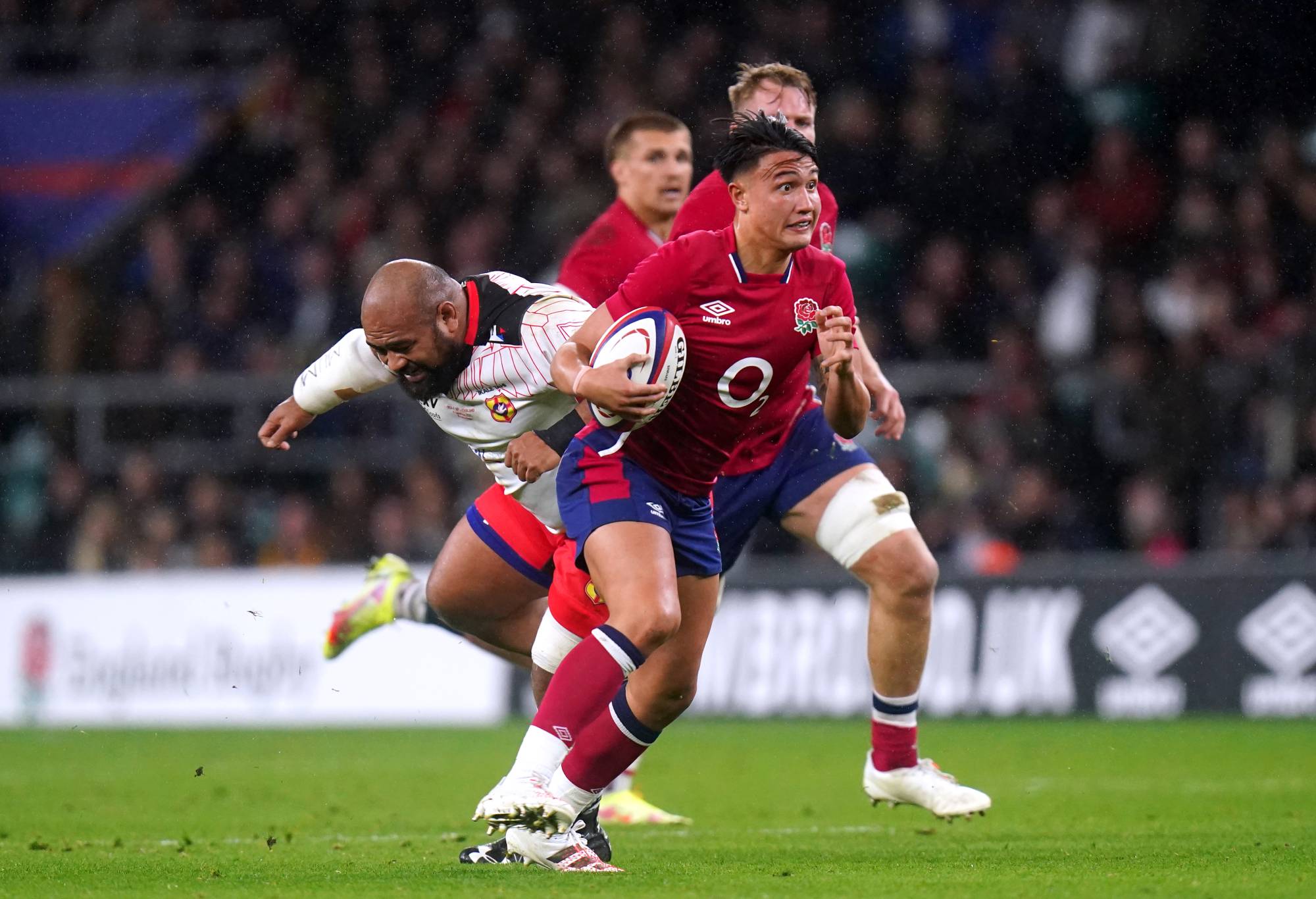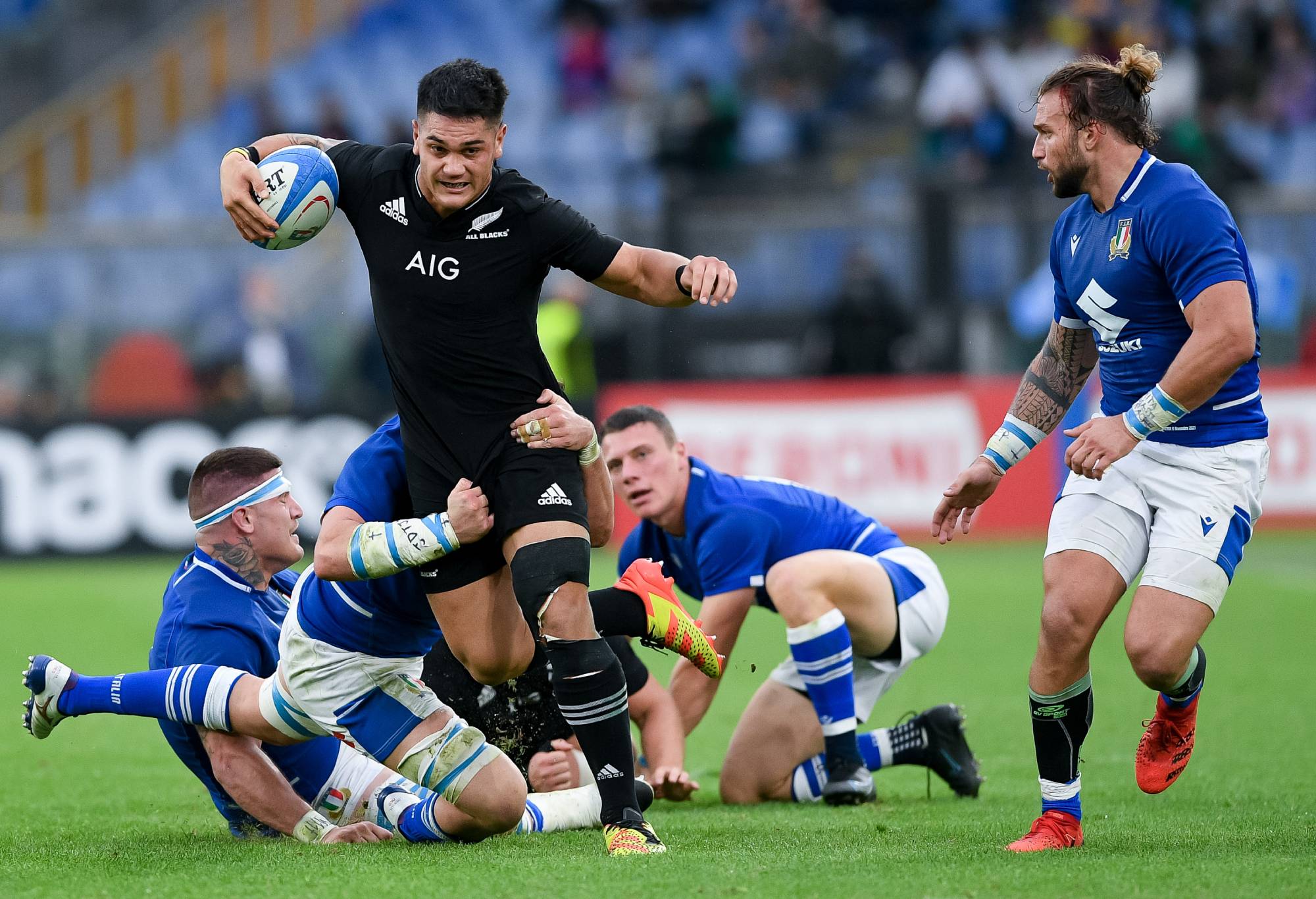EXCLUSIVE: Administrator urges private consortium be allowed to save Rebels amid claims RA won't engage
The Melbourne Rebels may have traded while insolvent for more than five years, giving rise to potential breach of director duty claims for the…
There were six matches of the Autumn Series this weekend including Australia’s 15-13 loss to Scotland. Here’s how the world’s media saw three of the blockbuster clashes.
England captain Owen Farrell has been cleared to face the Wallabies and win a 100th Test cap at Twickenham on Sunday (AEDT) after missing the 69-3 Tonga thrashing with a false positive test for COVID-19.
With Marcus Smith coming through a substitute appearance unscathed and with reputation enhanced, Eddie Jones could be tempted to give them both a start against the Wallabies.
Smith was a 51st minute replacement after struggling with a leg injury in the build up and won rave reviews from UK rugby writers.
“Marcus Smith sees things other fly halves do not: he does things other fly halves cannot,” wrote Stuart Barnes in The Times.
“Tonga are a proud rugby country but a poor team. Even so the evidence of Saturday screams the obvious. Here is the future of English rugby. There is no need to debate who wears the No. 10 shirt. There should not have been in the first autumn clash, for all the talk about his niggling injury.
“He strode on to the pitch in the 51st minute and made the match his own. The crowd went crazy when he supported Henry Slade on the inside for his try. More pertinently, so did the players. There is an exuberance to his game that rubs off on those around him. England need a dose of ecstasy. The 22-year-old Smith supplies it.

(Photo by Adam Davy/PA Images via Getty Images)
“He is a completely different sort of rugby player to the England captain, Owen Farrell. The Saracens player is uncompromising, often described as a “warrior”. Yet when the battle turns against England he has too frequently failed to deliver.”
World Cup winning coach Sir Clive Woodward, writing in the Daily Mail, said Jones must choose between Farrell and Smith at No.10 because his current centres need to play against the Wallabies.
“It is really difficult to judge these mismatches against Tier Two opponents — let’s face it, the game was basically a warm-up for the Australia match next week — but I was encouraged by the energy England showed on Saturday and the promise of much better things to come in the weeks and months ahead,” wrote Woodward.
“I am tipping England to beat both Australia and South Africa, although they will be very different games. It’s time for England to get some momentum back.
“The arrival of Marcus Smith’s twinkling feet midway through the second half on Saturday was the cherry on the cake. He is so hard to mark, but besides Smith getting a run-out in front of a full house, what impressed me most was the return to form of Henry Slade and Manu Tuilagi in the centre.
“These are England’s best two centres — and the best combination of centres — but because of Manu’s injury problems we have never seen enough of them together, so it’s heartening to see both in such fine fettle.
“This will pose head coach Eddie Jones a selection dilemma because Manu and Slade must be played together for the big matches. A Slade-Manu combo is what opponents least want to face. So pick them!
“It must be either Owen Farrell or Smith at 10, with the other on the bench. That will be one to chew over this week and next but you want that kind of tough decision to make.”
Robert Kitson, writing in the Observer, was bemused that Jones did not start Smith once Farrell had been ruled out.
He said Smith’s performance “will do little to hush the argument about who should wear England’s No. 10 jersey going forward.
“Surely this was an obvious opportunity to start with Smith, rather than ask him to deliver a late cameo? Or maybe not. Eddie Jones, the head coach, has never been the type to bend like a palm tree even in the face of gale-force public opinion.”
Ian McGeechan, writing in The Telegraph, praised England’s approach, specifically their attacking intent and lack of kicking.
“The standard of opposition coming up over the next two weekends is going to be a lot higher, but what a positive start that was to England’s autumn campaign,” he wrote. “11 tries, 651 metres run, 13 clean breaks, 37 defenders beaten.
“And perhaps this is the statistic which will most please a public that became jaded by all the aimless kicking earlier in the year: only 17 kicks from hand. England chose to kick the ball away 39 times against Scotland back in February.
“This was an extremely encouraging performance. Of course, against a team as limited as Tonga, England could expect to rack up some impressive figures. So there is no point getting carried away. But what I was most impressed with was their attitude and intent.”
He said he backed England to push on against Australia and South Africa.
“Whether England will over the next two weekends is another question entirely, but I would make them favourites to do so after that display and the confidence it will have given their younger players,” he wrote.
“More than the results, though, I think this autumn is all about the performances. England need an attacking blueprint if they are to stand a chance in 2023 and I think we saw the first signs of that on Saturday.”
All Blacks tragic, not magic
The All Blacks marched on with two world records set during their 47-9 defeat of Italy, but their media can be hard to please.
“Clunky, disjointed, scrappy. The All Blacks saved their worst performance of the season for Rome,” wrote Liam Napier in the New Zealand Herald.
“Ian Foster made wholesale changes to hand many fringe prospects the chance to impress against Italy. Those hoping to further their cases instead conspired to serve up an error strewn match which will leave Foster much more certain about reinstating many of his starting preferences next week.
“If you recorded this match with the intention of watching it back over breakfast, be prepared for unpleasant Sunday morning viewing.

(Photo by Giuseppe Maffia/NurPhoto via Getty Images)
“Other than replacement halfback Finlay Christie and Dane Coles, many of the All Blacks hoping to pressure incumbents will be disappointed with the clear collective regression. This was a major comedown from last week’s clinical dismantling of Wales in Cardiff.”
All Blacks’ Sam Cane agreed with the general sentiments.
“There were some testing times out there in terms of the frustration levels when we couldn’t get the game going how we would normally like to but it was a pretty good learning experience for a lot of the young guys,” Cane said.
“It probably highlighted the lack of experience when we were trying to set up for the haka and a lot of guys wanted to be in the back row. I was proud of the way we didn’t allow frustrations to creep in and affect our game too much.”
Gregor Paul, in the New Zealand Herald, was similarly scathing.
“The big hope was that a handful of players would deliver commanding performances in Rome and the All Blacks would be facing a number of tough selection calls for next week’s game against Ireland,” he wrote.
“For that to happen, the All Blacks needed to produce a flowing, cohesive performance: one where they got the basics of their game spot on and then iced it with their usual element of pass and catch brilliance.
“That great hope went unfulfilled. It was pass and catch tragic, not magic from the All Blacks on a day when their basics fell apart and they looked troubled and frantic, not mentally attuned to the task at all.”
Bombs away for Boks
The Springboks beat Wales 23-18 in their first match on tour, following on from their defeat of the All Blacks last month.
Craig Ray, writing in the Daily Maverick, hailed the Boks’ bomb squad for getting the team home in a match shrouded in controversy after a pitch invader interferred with a potential Welsh try.
“There was a time when it felt inevitable that a Springbok team would somehow surrender a late lead to lose tight games,” Ray wrote.
“That entire mindset has changed, because now it feels like the Springboks will win even when they’re trailing going into the final 10 minutes.
“The Boks’ growing composure in the tense final minutes of brutal Test matches is just one of the many areas in which they have excelled in recent years. That composure is a consequence of a bench that not only lifts Bok spirits, but demoralises opponents.”
Replacement hooker Malcolm Marx scored the winning try from the back of a rolling maul seven minutes from time in a perfect example of the impact of the Boks’ bench.
“The Bok “bomb squad” was not just a temporary solution to winning the World Cup in 2019, it’s a permanent part of their DNA now and will shape the way opponents approach clashes in weeks and years to come,” wrote Ray.
“The difference between being chosen to start, or being selected as a “reserve”, is almost meaningless in the Bok environment. Nienaber isn’t choosing eight subs in the hope that they will fill gaps when they arrive. They are chosen to take performance levels up a notch when they are introduced – at whatever stage of the match that might be.
“Frans Steyn epitomised that trait more than anyone. He was introduced against Wales after just 18 minutes when the unfortunate Damian Willemse suffered concussion.
“Steyn proceeded to have a whale of a game. He broke tackles almost at will, kicked a 54-metre penalty, jinked and danced his way through defenders and made telling hits. He has seldom looked happier on a rugby field and he embodied the spirit of the bomb squad by not just maintaining standards, but raising them.”